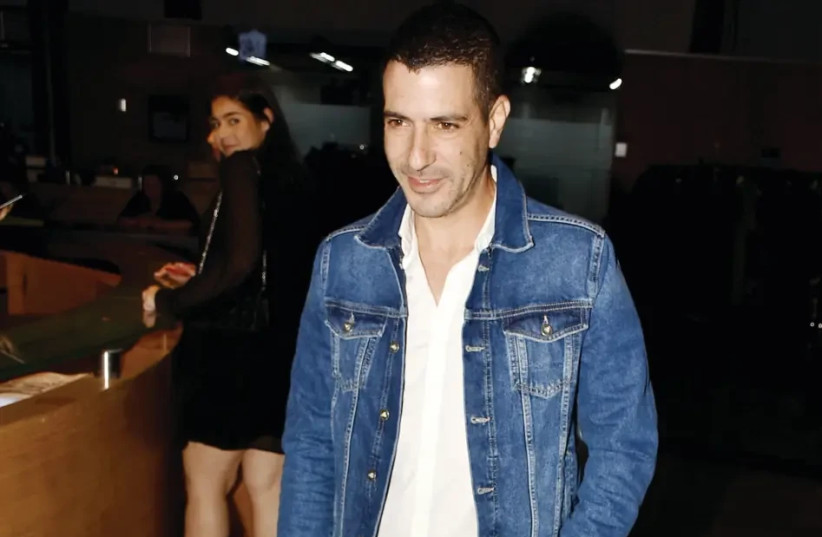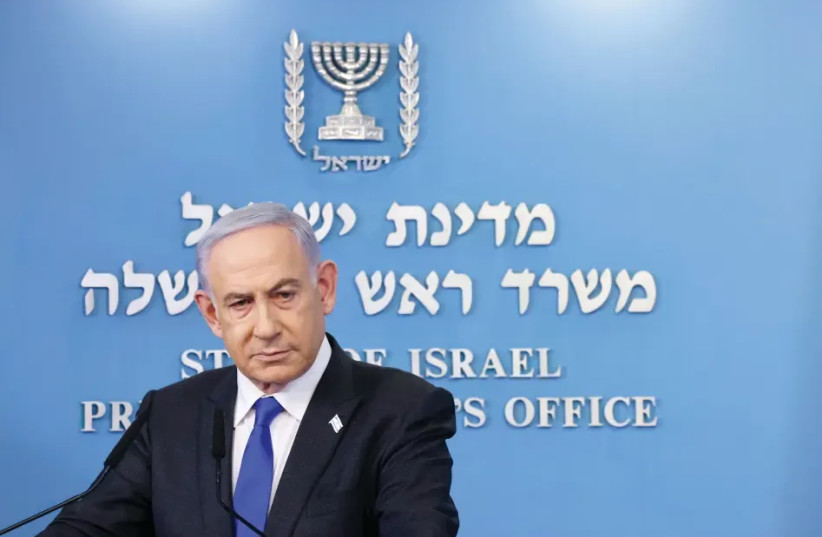For Maggie Tabibi, anchor of Channel 14's main newscast, the past year was full of impressive achievements in her career. Tabibi led the news channel to reach second place in ratings against old competitors, was chosen to lead the beacon lighting ceremony at Mount Herzl for this year's upcoming Independence Day in the most complex year of Israel's history, and last week, she earned a spot on the 2024 Forbes 30 Under 30 list.
At the beginning of the interview, Tabibi stated, "I thank God, blessed be He, for that. The achievement is His. I worked and continue to work hard to earn every achievement fairly.
"I'm not looking for concessions or favors, but to be appreciated for who I am," she said. "Every 'no' I received, every person who looked down on me, and everyone who didn't give me a chance only strengthened the hunger to leap forward. Therefore, faith and hard work are the answer for everyone who asks how I did it."
It is not easy to find free time in Tabibi's busy schedule, especially recently, when every evening she presents the main edition of Channel 14. In the morning, she shoots field reports, and she reserves the time in between to rehearse for the torch-lighting ceremony for Israeli Independence Day, observes Shabbat, and presents the Saturday night edition for the news.
Despite this, Tabibi was completely invested in the interview. She answered wisely and judiciously, knowing exactly what message she was trying to convey, was not afraid to answer difficult questions, and was totally invested.
What does the torch-lighting ceremony symbolize for you?
"It's a great privilege, especially during such a painful year the country is going through. In my eyes, the ceremony symbolizes the unity of the nation and the connection to common values, of love for man and the country. I am really excited about the position, and thankful to be chosen and for the opportunity to be a part of such an important event."

You are surely aware of the criticism of being chosen to host the torch-lighting ceremony by the right-wing government that Channel 14 is associated with. Even more, a year ago, you were chosen to direct the ceremony for Remembrance Day for Israel's fallen soldiers and the state rally to mark the 56th anniversary of the liberation of Jerusalem. What are your thoughts?
"A look at the archives reveals that quite a few journalists and news anchors have hosted one ceremony or another over the years. If another anchor, from another channel, had sat in this chair in my place, would that question have been asked? Probably not. There probably wouldn't have been any criticism or raised eyebrows either – on the contrary. The bottom line is, if I weren't worthy, I wouldn't have been chosen."
You have been chosen to host alongside Channel 12 correspondent Tamir Steinman. Is there an attempt to put channels 12 and 14 in the same category when, in practice, the differences in ratings and views are significant?
"The choice of Tamir Steinman as co-host is appropriate, and I welcome the joint directive. If a presenter from KAN News or Channel 13, channels with a much greater gap than Channel 12, were chosen, what would you say then? Is there an attempt to put the two in the same category? In my opinion, such a choice promotes a reality where it is also possible to work together."
Channel 14 has climbed to second place in the ratings. This is a surprising achievement, considering its popularity and the many criticisms it receives. Do you agree?
"Channel 14 has made a revolution in the last two and a half years. We have managed to break into the mainstream and, in a gradual process, win the trust of the public. The viewer gets an alternative that did not exist for years. The channel reflects the voices of a significant part of the people and continues to increase the viewership in other circles as well. Channel 12 is admittedly leading by a margin over their counterparts. Our dream of reaching their numbers, which was far-fetched in the past, is not imaginary any longer. We are creating a new reality."
The channel manages to make headlines because it is controversial, because of provocations and despicable statements made on the air, like Ari Shamai calling for the release of Yigal Amir, which resulted in advertisers withdrawing their business, and Patkhi and Shay, who asked Natalie Dadon to shoot at a glass and imagine that it was Shikma Bressler. Doesn't it bother you to be associated with such messages?
"I'll start from the end. I strongly disapprove of any inappropriate comments. I've expressed my opinion on this more than once in public – you're welcome to check. However, if we dive a little deeper, the controversial things were said in the context of expressing a personal opinion that you can agree or disagree with, but it's allowed. Harsh, blunt statements and sometimes even the tarnishing of entire sectors is also found on other channels, but somehow, we are always judged differently."
Your colleagues Ricklin, Segal, and Magal say they receive severe reactions from the public. Do you also experience them?
"I am certainly aware of what they are experiencing. I am sorry, and it is equally infuriating that journalists – who above everything are just human beings – have to deal with harassment or violent threats just because someone decided that there is no room for other thinking. Fortunately, I have not encountered such reactions personally. The public is very welcoming. Insignificant people stay behind the keyboard, where they probably find solace."
I've been told that you are very professional and serious and do not connect with others. How is your relationship with Yinon Magal?
"My relationship with Yinon is excellent. We meet almost every evening between the programs, and there is magic in that. If my focus on work means 'not connecting with others,' I can live with that in peace."
You give the impression of a perfectionist, but at the same time, you are very sensitive. How do you deal with criticism?
"First of all, thank you. The pursuit of professionalism is required, certainly in my work as a journalist and presenter of a publication. The position entails a great deal of responsibility along with a considerable commitment to the system and to the viewers at home, so the goal is to appear as professional as possible. This is very challenging, especially while working under pressure, but the satisfaction is tremendous. There is no doubt that there are stories that you take home with you at the end of the day, where the emotion also flows out.
"Regarding the criticisms - criticism is a legitimate matter, and it is good to have criticism, but when it comes from an insincere place and is dictated in advance, it is no longer criticism but petty politics. It's disappointing, but I've learned to ignore it and stick to my personal and professional truth."
Compared to provocative right-wing talents, you stand out doubly: in professionalism, eloquence, and hard work. It's not for nothing that they chose you from all the members of the channel to host the ceremony.
"I disagree with your definition of provocative right-wing talents, because what will be said about those who are on the other side of the map - aka the provocative Left? We have a talented team of both women and men who do not hesitate to express their opinions. Of global interest as a news presenter, not many know what is going on behind the scenes. My work day starts early. Hard work and determination are key. Those who look for shortcuts will find themselves on the outside."
You've come a long way in the last few months. You took a serious jump, starting with more interviews, field reports, and entering Gaza.
"I have come a long way professionally in a relatively short period of time. I owe the leap you are talking about to my curiosity, persistence, and desire to learn and become professional. I believe that there is always room to do more, learn more, and become better. The learning process is endless. This is what led me, among other things, to want to develop in other ways that do not necessarily relate only to my role as an anchor. Interviews are a fascinating world. I felt it when I was filming in Gaza."
How was your relationship with Sharon Gal? They talked about conflicts behind the scenes, now that he is leaving for another program on the channel, is there a feeling of relief? Will you work alone or find a substitute?
"My relationship with Sharon was good and professional. We had a beautiful journey together. As in any professional relationship on the screen, there are always challenges, but we learned to bridge everything. In any case, I wish him success in his new program. And no, there is no feeling of relief here. I will continue to lead as I have done since the beginning of the channel."
You said in the past that Yonit Levy is your role model. Is she still?
"I did say in the past that she was my role model. I appreciate her professional work, but today I am in a different place. I have come a long, long way, developing and continuing to develop, so currently my best investment is in the 'Maggie' model."
If you received a tempting offer from Channel 12, would you leave Channel 14? Would you change your political agenda in favor of the transition?
"I received and continue to receive offers. As a matter of fact, Channel 14 was the first to believe in me, so I owe them a debt of gratitude. You mentioned political opinions. My opinions should not interest anyone and certainly not the viewer at home, so you will never feel them on the screen. I am committed to professional truth and to that alone. It is sad that the profession of journalism has become an outdated term that has largely disappeared."

Since you are less likely to voice your political opinions, I would love to hear what you think about Netanyahu, who has not yet taken responsibility for October 7.
"Everyone whose hand was in the omission should bear responsibility and leave their positions: from the political level to the security level. I assume that for this purpose, a state commission of inquiry will also be established. It is not the time to close open accounts, when our fighters are still at the front. At this time, our strength is in our unity."

Where were you on the day of October 7?
"That Saturday I was at my mother's house in Holon. I woke up at 6:30 in the morning like everyone else to the sound of sirens. I tried to get an idea of the situation, but it took a while to understand what was really going on. My brother informed me about the difficult news that began to flow on the networks - I did not have my phone - only then did I realize that this was an event of magnitude that none of us knew."
What is the most difficult moment you have covered since October 7?
"An encounter with bereavement always evokes sadness in me, an emotion I didn't know. How can one comfort a mother who lost her heroic son or a woman who has lost the one dearest to her? It is impossible. An equally sensitive point is the coverage of the testimonies of the women who returned from captivity and thinking: "My heart goes out to those who are still there."
Do you believe the IDF should not stop until they reach total victory?
"I don't believe in slogans but in actions. Returning the kidnapped is a noble goal, and it is our moral duty as a society to do everything to bring them home. In the same breath, the victory will never be complete if we do not reach all those vile murderers who massacred and raped. Entry to Rafah is required - the sooner the better."
You mentioned the hostages. Is it true that Channel 14 supposedly covers less about the hostages?
"This is a false and unfair claim. I invite you to check the coverage of the issue in all the programs on the channel. Furthermore, the families of the hostages are also divided among themselves - one side calls for a deal at any cost, and the other side is convinced that only effective military pressure will do the job. Both positions are given a place of honor."
Channel 14 gets called names like Netanyahu's Propaganda Channel. How much does it bother you?
"I don't engage in cheap gossip. It's simply a stigma that's easy to stick to and mainly serves the left wing of the media who fear the threatening growth of the channel. It's true that we have presenters who openly support Netanyahu, but that doesn't for a moment prevent others, from presenters to commentators or reporters on the channel, from criticizing the government's moves."
What do you think about the reform that divided the people? The news release in your submission had a part in it.
"Did you know that three out of four Israelis express reservations about the Supreme Court? Not only is a reform of the judicial system necessary, but in my opinion, it should have been carried out much earlier. This is an elitist system that for years has managed to erode the public's trust in it when it earns it honestly."
Where is the ethnic diversity? This is well proven by the statement of retired Supreme Court President Aharon Barak who said that he was unable to find a single worthy Mizrahi judge. Is this the system that is supposed to represent me or you?
"Regarding the reform led by the government, the idea is great but the execution isn't. If the reform had been in stages while embarking on a clear information campaign for the public, we would be in a different place today. The claim that Channel 14 is the one that took part in the division is a claim disconnected from reality. What led to the division and the sad rift in society is 'fraternal hatred' that I didn't believe existed - the reform was just the excuse."
The number of female ministers and CEOs in the current government is smaller than ever. How do you react to this as an independent and strong woman who records impressive achievements based on your abilities and skills?
"Take an interesting statistic. Since the establishment of the state until today, 32 religious women have been appointed in the government and 16 women as deputy ministers. In other words, Israel lags behind most countries of the Western world in the proportion of women in key positions.
"This was not established yesterday. A deep root change is needed in the existing reality with an emphasis on the social world view that for years was founded on patriarchal foundations. The last war proves how worthy, necessary, and capable women are of doing everything, even on the battlefield."

Do you have friends who oppose the government?
"I live in a fantastic duality. I have friends who are supporters of the current government and those who go out every Saturday to demonstrate in Kaplan. We agree not to always agree on everything, but what we all have in common is that we leave politics outside the door – there is enough of it anyway."
Most of the prominent celebrities in the entertainment industry have broken their silence in the past year when they voiced sharp criticism against the government. Where does that put you in front of them as someone who supports the government? Do you feel like an outsider in the industry?
"How did you come to the conclusion that I support the government or alternatively oppose it? We are a democratic country and everyone has the right to have their voice heard. Only those who see fit to criticize should at least know that the place for change is at the ballot box. That's how a government is elected and that's how it changes. In the majority opinion."
In the last five years, the news service has begun a process of becoming more religious, which includes keeping Shabbat. How do you feel about it?
"The gift of Shabbat is a treasure and not only in the halachic [Jewish legal] aspect. I live high-stress throughout the week, so Shabbat is the only time that allows me to recharge. I disconnect from everything that happens around me and connect not only to myself but also to the family that surrounds me. There is no substitute for it."
What was the trigger that made you approach religion?
"My conversion process is the best thing I could have asked for. Faith has become an anchor over the years, keeping me sane. It is strength even in difficult times. If I try to put my finger on the trigger, it will probably be somewhere shortly after leaving the show Big Brother where I first became known in the media. I was at a very dark point in life and no one was there to stand by me. In retrospect, this breaking point was my rebirth.
"Today, observing Shabbat, praying, or going to synagogue has become an inseparable part of who I am. I have often testified that my agent is the Holy One, blessed be He. I'll keep saying it out loud. I owe Him everything I have."
How did you manage to get to where you are today?
"I started out about three years ago as a reporter and then as a presenter on Channel 20, which later became Channel 14. The field of news fascinated me. The ambition to become a journalist and investigate current events quickly took shape. I spent days and nights studying, researching, and producing interesting content. The peak was when I was chosen to present the main edition in 2021.
"I don't think there is one formula for success. To be honest, it didn't bother me to move between one world and another either. The road was not easy and was accompanied by many challenges. They closed the door in my face quite a bit, and when they closed, I looked for the window. Faith is the key.
"I believed in the Holy One, blessed be He, I believed in myself. The biggest tip I can possibly give is to not allow your fear to be greater than your faith. It's easiest to give up. Dare to dream even of the impossible; breaking boundaries has never been a dirty word."
The attribute of excellence accompanied Tabibi all her life, even in her military service, where she served in the military police. Over the years she also managed to get a bachelor's degree in law, and as a child, she was an athlete: an excellent and competitive swimmer. Regarding this, she commented:
"I started learning to swim at the age of six even though I hated the water," she says. "What started as a swimming course turned into a great love of life: eleven years of hard work, around the clock. I became addicted to competition, to adrenaline, to thinking that every day you can be better or faster than you were yesterday. When I retired, just before I drafted, I realized that I had reached a sense of exhaustion, that my biggest dream probably wasn't to be an athlete at the age of 30."
You have come a long way in your career. What about relationships, home life, and family?
"Everything in its time. I'm not chasing age and I'm certainly not standing with a watch asking when it will happen. I'm currently focusing on writing a very significant chapter in my life, and it will continue to get my full attention until I decide it's time to write another chapter. My priorities are clear – and by the way, they were clear from a young age – my mother will testify to that."
Tabibi was born and raised in Holon under her birth name, Margaret Kakouli, to parents of Persian origin, and she has one brother. Her parents divorced when she was seven years old, and her relationship with her father was severed for many years and renewed very recently. Regarding this, Tabibi stated,
"I don't remember much from those days. My father came back into my life when I was 18 years old, and I met him for the first time not long ago. I have to attribute my getting close to him to my religious journey because ultimately, that's what led me to a very reconciled place. It is true that this is a process that does not happen instantly, but the charges and question marks have become a thing of the past. Life is too short to beat yourself up. Today I'm happy and grateful for the relationship with him."
Why did you choose to change your last name as an adult?
"I was born with the name Kakouli, and towards the age of 20, I decided to change it to my current name Tabibi out of a deep sense of respect and appreciation for my mother. She is a true lioness who fought for me and my brother over the years. This is the least I could do for her."
You have come far and fast in your career, what else do you aspire to achieve? Politics?
"The million dollar question. I am often asked if my next stop in life is politics. A decade ago I would have probably answered yes to the question. I have always dreamed of making an impact, of being part of the leaders of change in society – that is why the field drew me in.
"Fortunately, the years have taught me otherwise. I believe that today, in my humble position, I have the ability to influence much more and represent the voice of many, many women. So what's next from here? Whatever the Holy One decides, blessed be He, will be welcomed."
And finally - security has collapsed, soldiers have lost their lives, the kidnapped are deteriorating in Gaza, Hamas has not been defeated, there is a new front against Iran, refugee families have been in hell for six months, inflation is rising, credit is down, division is at its peak, education has failed, and this is just the tip of the iceberg. Are we on the way to destruction? What do you think will happen here?
"We are not on the road to destruction – period. The hysteria is unnecessary. We are a strong nation that throughout history has known how to deal with reality no matter how difficult it may be. I believe and pray to the Holy One, blessed be He, that now more than ever we will know how to rise above any controversy and maintain a society that knows how to accommodate and respect the differences as well."
